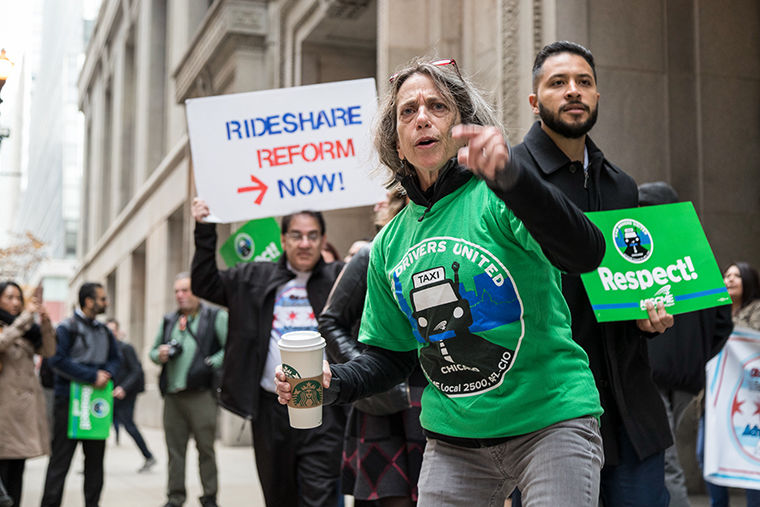Ride-share, cab drivers unify for better regulations
November 2, 2018
Taxi, Uber and Lyft drivers chanted “drivers united will never be defeated” as they demanded safety regulations, better wages and increased transparency from the city at a rally on Oct. 31.
“For years the city has instituted an unfair standard with ride-share regulations and taxi regulations. Today, we are coming together to say enough is enough,” said David Kreisman, spokesperson for Cab Drivers United. “We’re asking for sensible legislation that only the City Council can provide.”
The drivers want a cap on the number of cars allowed to participate in ride-share services, specifically, cars coming in from out of state, Kreisman said.
“There’s an unlimited number of ride-share vehicles on the road right now, so when you have such a saturated market, nobody is making any money, except for Uber corporate,” Kreisman said. “You get into an Uber or Lyft [and] half the time it’s a Michigan, Indiana, Wisconsin license plate; they’re coming here—not paying taxes here— working. That’s killing the livelihood of drivers who work full time in the city.”
Drivers sought to get the attention of aldermen and show a wide range of drivers coming together, according to Eli Martin, a co-founder of Chicago Ride-share Advocacy.
“We will bring our petition signatures and our petition law changes to the test and to the people inside of here, and they will decide if they will side with the drivers of all transportation communities, their families and the passengers who are also affected,” said Lenny Sanchez, a founder of Chicago Ride-share Advocates.
According to a May 15 study from the Economic Policy Institute, Uber drivers can earn about $9.21 an hour. The study factored in Uber’s commissions, vehicle expenses and the cost for health insurance. Higher wages are something that ride-share drivers and taxi drivers want to see changed, Martin said.
“There are zero benefits, there’s no paid time off, there’s no health insurance and there are no sick days,” Martin said. “Once you factor in your operating costs of owning a vehicle and all of these other things, most ride-share drivers are now making around minimum wage or less than minimum wage, and again, that’s for a job with no benefits.”
Ride-share and cab drivers want the same safety regulations implemented, according to cab driver Nnamdi Uwazie.
The safety protocol for Uber and Lyft cars is a lot more relaxed than for cabs, Kreisman said.
“We came together now to send a single message—we need the safety of the customers, we need the safety of the drivers,” Uwazie said. “[The customers] want to enter their ride and get to where they are going safely and not to be harmed.”
The drivers know this is only the first step to getting recognition for the demands they want, Sanchez said.
“We will continue to seek support from our driver community, we will continue to educate our fellow drivers and passengers and, no matter what, we are bringing this fight, and we’re going to continue,” Sanchez said.








